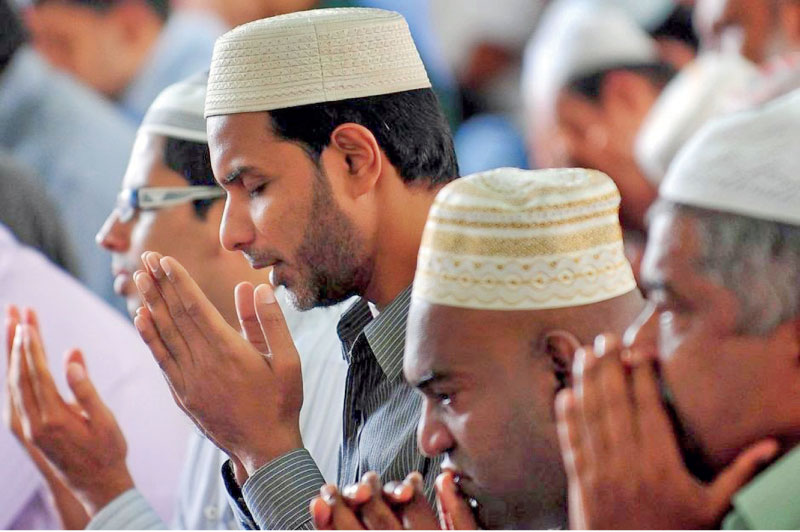Tuesday Feb 17, 2026
Tuesday Feb 17, 2026
Friday, 7 June 2024 00:00 - - {{hitsCtrl.values.hits}}

Once again, this community finds itself entangled in domestic and regional political intrigue
 The age-old adage “Once Bitten, Twice Shy” is a well-known and frequently used phrase of admonition that many Sri Lankans, especially those from the middle and upper strata of society, have grown up hearing during their school years. This often-repeated saying typically forms the lower rungs of a ”disciplinary ladder” that, for many of us, ended with corporal punishment in the principal’s or headmaster’s office, depending on the title of the chief administrative officer at our respective schools.
The age-old adage “Once Bitten, Twice Shy” is a well-known and frequently used phrase of admonition that many Sri Lankans, especially those from the middle and upper strata of society, have grown up hearing during their school years. This often-repeated saying typically forms the lower rungs of a ”disciplinary ladder” that, for many of us, ended with corporal punishment in the principal’s or headmaster’s office, depending on the title of the chief administrative officer at our respective schools.
However, in the context of this article, the writer uses this phrase with a sense of dread, applying its message to his co-religionists in Sri Lanka—the Sri Lankan Muslim community. Once again, this community finds itself entangled in domestic and regional political intrigue. Their cultural and religious practices, along with the supposed geopolitical implications attributed to them by external experts and academics, have been dissected, discussed, and occasionally maligned in public forums.
The Muslims of Sri Lanka, many of whom have risked life and limb (like the writer) to serve their country, have been left perturbed and shocked by the charges levelled against them by various segments of Sri Lankan society, particularly from sections of the political class and the press. The writer succinctly states: “Once Bitten, Twice Shy.” Members of the Muslim community must be keenly aware of forces, both internal and external, that might attempt to spread an alien and toxic brand of “Islamic Thought,” purportedly practiced in the Middle East. This so-called “Islamic Thought” or “IS ideology” is a deviant political experiment, the product of Colonial British designs against the Ottoman Empire. Like the virus in any good horror movie, this one escaped the “lab” where it was created and continues to wreak havoc. The writer asserts with the utmost confidence that this IS ideology is now public enemy No. 1 in the Middle East, where it was originally bred.
Unfortunately, the current wave of Hindutva-based ethno-nationalism sweeping India, coupled with a similar Sinhala-Buddhist-oriented ethno-nationalism embraced by a vocal minority in Sri Lanka’s political class and intelligentsia, has made the IS ideology seem like a counterweight to these forces. This is why all sections of the Government, security services, and civil society must be vigilant. The writer emphasises that a special onus falls on the Sri Lankan Muslim community, particularly its religious leaders and political representatives, to prevent anti-Islamic forces from planting this perverse IS ideology as a counterweight to the bigotry and blatant Islamophobia propagated by the Sinhala-Buddhist right wing.
It pains the writer to remind the Muslim community of the Easter attacks and the subsequent pain and subjugation they experienced. However, as the saying goes, “It Takes Two to Tango.” Recently, a well-known security studies academic warned of an impending resurgence of violent terrorism emanating from the Sri Lankan Muslim community. His latest article refers to the arrest of four alleged IS members in India, all of whom are Sri Lankan. Background checks indicate they have ties to the Sri Lankan underworld and have likely been engaged in smuggling from India for some time. A few weeks before this article, the same academic predicted a resurgence of IS terrorism in Sri Lanka. Whether this is clairvoyance, coincidence, or design, the writer leaves that judgment to the readers’ discretion.
Furthermore, the writer has consistently warned his former colleagues, especially this security academic, not to chase “Pink Elephants”—a metaphor for misleading or illusory problems. Such ideological dogma dulls the intellect and hampers the problem-solving skills of intelligence professionals. Moreover, the morale of the intelligence services suffers when they are compelled to sycophantically comply with politically motivated directives from senior officials, leading to lower quality intelligence gathering and analysis. In the long run, this could handicap Sri Lankan policymakers in making correct and timely decisions.
Objective analysis of the root of any matter naturally transcends human prejudice, stereotypes, hearsay, and old wives’ tales. In this context, one must question uncontested facts readily available in the public domain. When incriminating leads and leaks are processed using Occam’s razor principle, they often lead to significantly constructive conclusions and justifiable outcomes, unless explicitly proven otherwise. This reality will be etched into the annals of history and remain within the purview of critical minds. If you understand this, you will realise where and how your efforts and concerns should be focused and what lingers in the minds of men. This is the domain that is too often ignored.
In summary, this writer has the following messages:
To the rest of Sri Lankan society: Don’t let Islamophobic bigots hijack the narrative; “It Takes Two to Tango.”
(The writer is a retired Senior Superintendent of Police, former Head of Counterintelligence – State Intelligence Service, Sri Lanka, and former First Secretary (Defence), Sri Lanka Embassy in Thailand. He is presently serving as a member of the Sri Lanka Wakf Board.)